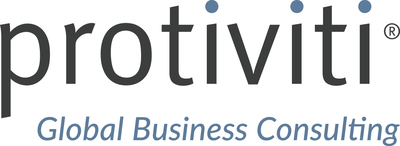Protiviti-Oxford University Survey Finds Only 8% of Global Business Leaders Have Serious Concerns About Their Organizations' Ability to Protect Customer Data
Only 8% of global executives express serious concerns about their company's ability to protect customer data over the next five years, according to a new Protiviti-Oxford University survey. Despite growing cyber threats, 76% of business leaders report very mild to no concern about data protection. The study reveals a stark contradiction: while executives show high confidence in organizational data security, with 84% believing their organization is effective in maintaining customer trust, 78% worry about their own personal data privacy.
The survey identifies key challenges in privacy compliance, including maintaining control amid emerging threats and managing conflicting privacy regimes. 74% of companies claim a positive reputation for privacy protection compared to competitors, while 77% feel confident about their employees' understanding of data security importance. Looking ahead, 75% of executives expect AI to significantly impact their data privacy strategies.
Solo l'8% degli executive globali esprime seri timori riguardo alla capacità della propria azienda di proteggere i dati dei clienti nei prossimi cinque anni, secondo un nuovo sondaggio di Protiviti-Oxford University. Nonostante le crescenti minacce informatiche, il 76% dei leader aziendali riporta preoccupazioni molto lievi o addirittura assenti sulla protezione dei dati. Lo studio rivela una contraddizione notevole: mentre gli executive mostrano una grande fiducia nella sicurezza dei dati organizzativi, con l'84% convinto che la propria organizzazione sia efficace nel mantenere la fiducia dei clienti, il 78% è preoccupato per la propria privacy dei dati personali.
Il sondaggio identifica le principali sfide nella conformità alla privacy, inclusa la difficoltà di mantenere il controllo di fronte a minacce emergenti e la gestione di regimi di privacy contrastanti. Il 74% delle aziende afferma di avere una reputazione positiva per la protezione della privacy rispetto ai concorrenti, mentre il 77% si sente fiducioso riguardo alla comprensione da parte dei propri dipendenti dell'importanza della sicurezza dei dati. Guardando al futuro, il 75% degli executive si aspetta che l'IA avrà un impatto significativo sulle proprie strategie di privacy dei dati.
Solo el 8% de los ejecutivos globales expresa serias preocupaciones sobre la capacidad de su empresa para proteger los datos de los clientes en los próximos cinco años, según una nueva encuesta de Protiviti-Oxford University. A pesar de las crecientes amenazas cibernéticas, el 76% de los líderes empresariales informa de preocupaciones muy leves o inexistentes sobre la protección de datos. El estudio revela una contradicción notable: mientras los ejecutivos demuestran una alta confianza en la seguridad de los datos organizacionales, con el 84% creyendo que su organización es eficaz en mantener la confianza del cliente, el 78% se preocupa por la privacidad de sus propios datos personales.
La encuesta identifica los principales desafíos en el cumplimiento de la privacidad, incluyendo mantener el control en medio de amenazas emergentes y gestionar regímenes de privacidad conflictivos. El 74% de las empresas afirma tener una reputación positiva en la protección de la privacidad en comparación con sus competidores, mientras que el 77% se siente seguro sobre la comprensión de sus empleados sobre la importancia de la seguridad de los datos. Mirando hacia adelante, el 75% de los ejecutivos espera que la IA impacte significativamente en sus estrategias de privacidad de datos.
전 세계 경영진의 단 8%만이 향후 5년 동안 고객 데이터를 보호할 수 있는 회사의 능력에 대해 심각한 우려를 나타냅니다, Protiviti-Oxford University의 새로운 조사에 따르면. 사이버 위협이 증가함에도 불구하고, 76%의 비즈니스 리더는 데이터 보호에 대해 매우 낮거나 전혀 걱정하지 않는다고 보고했습니다. 이 연구는 뚜렷한 모순을 드러냅니다: 경영진은 조직 데이터 보안에 대한 높은 신뢰를 보이고 있으며, 84%는 자기가 속한 조직이 고객 신뢰를 유지하는 데 효과적이라고 믿지만, 78%는 자신의 개인 데이터 프라이버시를 걱정하고 있습니다.
조사는 개인정보 보호 준수의 주요 문제를 식별하며, 새로운 위협 속에서도 통제를 유지하고 상충되는 개인정보 보호 체제를 관리하는 것에 대한 어려움을 포함합니다. 74%의 기업이 경쟁사에 비해 개인정보 보호에 대한 긍정적인 명성을 가지고 있다고 주장합니다, 그리고 77%는 직원들이 데이터 보안의 중요성을 이해하고 있다고 확신하고 있습니다. 앞으로 75%의 경영진은 AI가 자신의 데이터 프라이버시 전략에 상당한 영향을 미칠 것으로 예상합니다.
Seulement 8% des dirigeants mondiaux expriment de sérieuses inquiétudes quant à la capacité de leur entreprise à protéger les données des clients au cours des cinq prochaines années, selon une nouvelle enquête de Protiviti-Oxford University. Malgré la montée des menaces cybernétiques, 76% des chefs d'entreprise déclarent des préoccupations très faibles ou inexistantes concernant la protection des données. L'étude révèle une contradiction saisissante : alors que les dirigeants affichent une grande confiance dans la sécurité des données organisationnelles, avec 84% croyant que leur organisation est efficace pour maintenir la confiance des clients, 78% s'inquiètent pour leur propre vie privée des données personnelles.
L'enquête identifie les principaux défis en matière de conformité à la vie privée, y compris le maintien du contrôle face à des menaces émergentes et la gestion de régimes de confidentialité conflictuels. 74% des entreprises affirment avoir une réputation positive en matière de protection de la vie privée par rapport à leurs concurrents, tandis que 77% se sentent confiants quant à la compréhension de l'importance de la sécurité des données par leurs employés. À l'avenir, 75% des dirigeants s'attendent à ce que l'IA ait un impact significatif sur leurs stratégies de protection de la vie privée des données.
Nur 8% der globalen Führungskräfte äußern ernsthafte Bedenken hinsichtlich der Fähigkeit ihres Unternehmens, Kundendaten in den nächsten fünf Jahren zu schützen, so eine neue Umfrage von Protiviti-Oxford University. Trotz wachsender Cyberbedrohungen berichten 76% der Unternehmensleiter von sehr milden oder gar keinen Bedenken bezüglich des Datenschutzes. Die Studie zeigt einen deutlichen Widerspruch: Während die Führungskräfte ein hohes Vertrauen in die Datensicherheit ihrer Organisation zeigen – 84% glauben, dass ihre Organisation effektiv darin ist, das Vertrauen der Kunden aufrechtzuerhalten – sorgen sich 78% um die Privatsphäre ihrer eigenen persönlichen Daten.
Die Umfrage identifiziert zentrale Herausforderungen beim Datenschutz, einschließlich der Kontrolle inmitten aufkommender Bedrohungen und der Verwaltung widersprüchlicher Datenschutzregelungen. 74% der Unternehmen behaupten, im Vergleich zu Wettbewerbern einen positiven Ruf für den Datenschutz zu haben, während 77% zuversichtlich sind, dass ihre Mitarbeiter die Bedeutung der Datensicherheit verstehen. In die Zukunft blickend erwartet eine Mehrheit von 75% der Führungskräfte, dass KI einen erheblichen Einfluss auf ihre Datenschutzstrategien haben wird.
- None.
- None.
The survey found that business executives retain high confidence about their organizations' data privacy readiness and ability to safeguard data. Surprisingly,
"Consumers today are increasingly concerned about the protection of their personal data online. As the data privacy landscape continues to evolve and new technologies emerge at an increasingly fast pace, it's critical for leaders to evaluate their privacy programs from all angles," said Sameer Ansari, global leader, security and privacy, Protiviti. "The rapid advancement of GenAI across enterprises can often outpace existing privacy regulations creating protection gaps for customers."
Data Security Requires Collaboration Between Employer and Employees
A significant majority of executives (
The survey reveals strong confidence in the organization's ability to maintain customer trust regarding data security, with
Contradicting Personal Privacy Concerns
The survey reveals an astonishing discrepancy between executives' confidence in their company's data protection capabilities and their concerns about their personal data privacy. While only
Top Challenges to Data Privacy Compliance
When surveyed about their companies' biggest challenges in complying with privacy regulations, respondents identified the following top three issues:
- Maintaining an effective control environment amid emerging threats
- Identifying all internal systems that contain personal data
- Dealing with different and sometimes conflicting data privacy regimes
Regionally, the challenges varied: in
Looking Ahead: AI's Role in Privacy Protection Outpaces Other Emerging Technologies
As privacy and cybersecurity remain at the forefront of business concerns, three-quarters of global executives expect AI to impact significantly their data privacy strategies moving forward. The belief that AI will be a force for good in privacy protection was consistent across geographies, industries and age groups. In contrast, a mere
In terms of addressing privacy concerns, AI outpaced other emerging technologies like augmented and virtual reality (
"There's no doubt AI and other emerging technologies will have a significant impact on data protection and privacy. While executives express a positive outlook on AI to protect consumer data, it will be important for business leaders to also clearly understand the risks of threat actors using AI to access customer data in new malicious ways," said Cory Gunderson, chief operating officer and executive vice president, global solutions, Protiviti.
The study surveyed 250 board members, C-suite executives and other business leaders in 14 countries in
Learn More About the Future of Privacy, 2030 and Beyond
The survey report, "Executive Outlook on the Future of Privacy, 2030" is available for complimentary download at VISION by Protiviti. This edition of VISION features additional content and insights from privacy luminaries and leaders from the world's top companies, including:
- Former Apple, Google CPOs on the future of data privacy
- Microsoft's Sarah Armstrong-Smith on protecting data and minimizing threat
- Future of Privacy Forum CEO Jules Polonetsky on "exciting but risky" road ahead
- The Economist's Dexter Thillien: Privacy in peril amid digital data explosion
- UPenn Wharton School Vice Dean, Mauro F. Guillén: How AI radically changes the data privacy landscape
- Protiviti's Tom Moore on the evolution of the CPO and its uncertain future
About The University of Oxford
Established in 2018, the Global Centre on Healthcare and Urbanisation (GCHU) at Kellogg College, University of Oxford, brings together leading and influential thinkers in an interdisciplinary approach embracing evidence-based healthcare, sustainable urban development, and education, and provides a collaborative forum for organisations active in these disciplines. The GCHU asks vital questions on the role of cities in healthcare and wellbeing to better understand the impact and consequences of urbanisation, trains and informs the next leaders in healthcare and urbanisation to nurture the highest standards, and undertakes research and scholarship at the intersection of healthcare and urbanisation to inform recommendations for future practice.
About Protiviti
Protiviti (www.protiviti.com) is a global consulting firm that delivers deep expertise, objective insights, a tailored approach and unparalleled collaboration to help leaders confidently face the future. Protiviti and its independent and locally owned member firms provide clients with consulting and managed solutions in finance, technology, operations, data, digital, legal, HR, risk and internal audit through a network of more than 90 offices in over 25 countries.
Named to the Fortune 100 Best Companies to Work For® list for the 10th consecutive year, Protiviti has served more than 80 percent of Fortune 100 and nearly 80 percent of Fortune 500 companies. The firm also works with government agencies and smaller, growing companies, including those looking to go public. Protiviti is a wholly owned subsidiary of Robert Half (NYSE: RHI).
![]() View original content to download multimedia:https://www.prnewswire.com/news-releases/protiviti-oxford-university-survey-finds-only-8-of-global-business-leaders-have-serious-concerns-about-their-organizations-ability-to-protect-customer-data-302294654.html
View original content to download multimedia:https://www.prnewswire.com/news-releases/protiviti-oxford-university-survey-finds-only-8-of-global-business-leaders-have-serious-concerns-about-their-organizations-ability-to-protect-customer-data-302294654.html
SOURCE Protiviti








